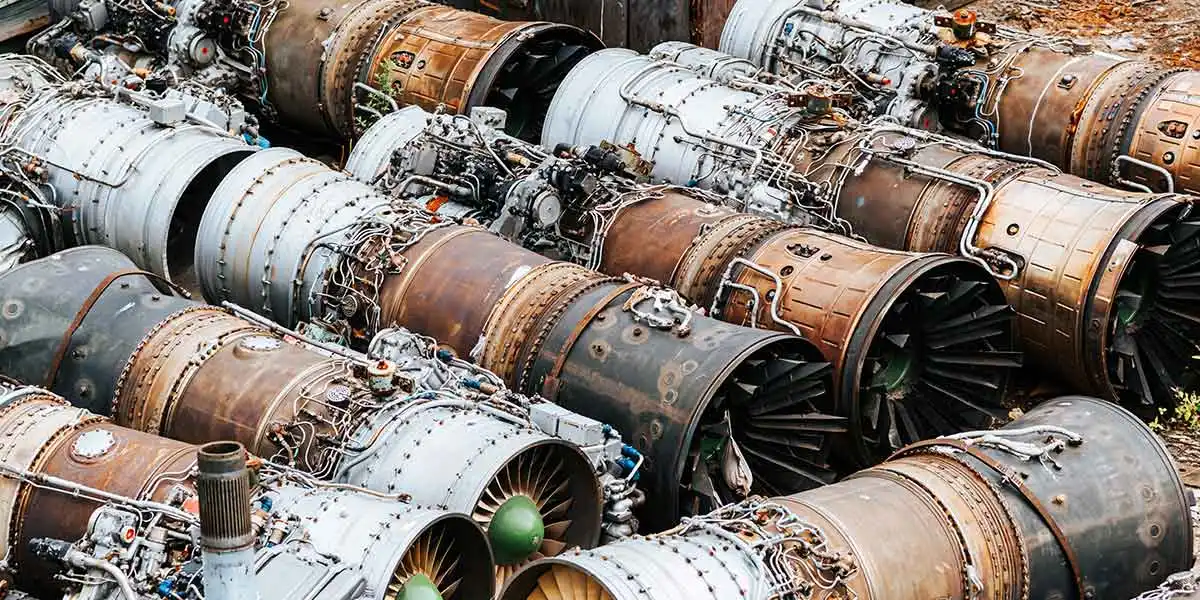
May 22, 2024
A lesser-known but no less important sector exists in the massive aviation industry, where sleek planes glide through the skies: aircraft recycling. The market for recycled airplanes stands out as a symbol of both economic potential and environmental responsibility as the globe works toward sustainability. This blog post delves into the worldwide aircraft recycling market's dynamics, examining its importance, patterns, difficulties, and potential.
According to BCC Research, The global market for aircraft recycling is expected to grow from $4.7 billion in 2023 and projected to reach $9.7 billion by the end of 2028, at a compound annual growth rate (CAGR) of 15.8% during the forecast period of 2023-2028.

The global market for aircraft recycling is expected to grow from $4.7 billion in 2023 and projected to reach $9.7 billion by the end of 2028, at a compound annual growth rate (CAGR) of 15.8% during the forecast period of 2023-2028.
Even though they are technical marvels, aircraft have limited lives. When their useful life is coming to an end, it is crucial to dispose of them responsibly. Retired aircraft are disassembled and recycled in order to salvage valuable materials and parts with the least amount of negative environmental impact. Almost 90% of an aircraft may be recycled, from engines and electronics to metals like titanium and aluminum.
Environmental Sustainability
Recycling used aircraft is essential to lowering the aviation sector's carbon impact. Recycling reduces landfill waste and energy used in the production of new parts by preserving materials and components and lessening the environmental effect of disposing of airplanes.
Resource Conservation
Metals and composites are two limited materials that are heavily used in the aircraft industry. By allowing these materials to be recovered and reused, recycling helps to preserve natural resources and lessens the need for virgin manufacture, which frequently requires large energy expenditures.
Economic Opportunities
Aircraft recycling has significant economic benefits in addition to environmental ones. The demand from a variety of industries, including the automotive, construction, and industrial sectors, has created a strong market for recycled aviation materials and components. Furthermore, recycling centers boost local economies and generate jobs.
Technological Advancements
Aircraft recycling is changing dramatically thanks to technological advancements in recycling. Modern procedures that increase productivity, lower expenses, and raise safety requirements include automated disassembly and material separation methods.
Regulatory Pressures
Manufacturers and operators are required to implement appropriate disposal techniques by strict environmental legislation and aircraft end-of-life directives. Growing industrial practices and market expansion are attributed to the growing importance of regulatory compliance and certification standards.
Circular Economy Initiatives
Across industries, the idea of a circular economy—which emphasizes waste reduction and resource efficiency—is gaining support. This paradigm is supported by aircraft recycling, which closes the circle on resource usage and encourages sustainability throughout the aviation lifecycle.
Technological Complexity
Even with these developments, recycling aircraft is still a technically difficult task. Modern aircraft are complicated machines with sophisticated systems and composite materials that make recycling and disassembly difficult. This calls for constant innovation and R&D spending.
Infrastructure Limitations
Recycling aircraft calls for specialized facilities with cutting-edge equipment and a crew with experience. The lack of such infrastructure, particularly in developing nations, makes it difficult to grow the industry. For the global aircraft recycling industry to reach its full potential, infrastructure expansion investments are essential.
Market Growth Potential
The market for recycled aircraft is expected to increase significantly in the upcoming years, despite several obstacles. Sustainable disposal options will become more and more in demand due to growing environmental consciousness, legislative pressures, and technical advancements. Furthermore, as newer, more fuel-efficient models gradually replace older ones, the growing fleet of retired aircraft will support market growth.
AAR Corporation: A recognized aviation services firm that specializes in the dismantling and recycling of airplanes. AAR is a major force in the market thanks to its vast experience and widespread presence.
Aircraft End-of-Life Solutions (AELS): AELS is known for its creative methods for recycling and dismantling airplanes, as well as its dedication to sustainability. It is based in the Netherlands and is well-known for its knowledge and eco-friendly operations.
Tarmac Aerosave: Tarmac Aerosave is a prominent player in the storage, maintenance, and recycling of aircraft, with its headquarters located in France. Its extensive offerings and advantageous locations have made it a valuable partner for manufacturers, lessors, and airlines looking for environmentally friendly ways to dispose of their end-of-life aircraft.
These three companies are notable for their substantial advancements of sustainable practices and provision of vital services to the aviation industry, as well as their substantial contributions to the aircraft recycling industry.
In conclusion, the global market for recycled aircraft is located where technological innovation, commercial viability, and environmental stewardship converge. As sustainability becomes more and more integrated into the aviation sector's operations, aircraft recycling becomes a critical way to reduce environmental impact, conserve resources, and create new business opportunities. The market for recycled aircraft offers hope for a more environmentally friendly and sustainable future for the airspace above us, provided that stakeholders from all facets of the aviation ecosystem work together.
Consider becoming a member of the BCC Research library and gain access to our full catalog of market research reports in your industry. Not seeing what you are looking for? We offer custom solutions too, including our new product line: Custom Intelligence Services.
Contact us today to find out more.

Sandeep is a Senior Executive in Marketing Operations at BCC Research, proficiently serving as a graphic designer and content creative specialist. His expertise extends to AutoCAD and Revit, and he has made valuable contributions to the event industry with his design skills.

Biophotonics: Technologies and Global Markets (PHO024B)

Global Trade: A Strategic Shift The global trade environment is undergoing a dra...

The global demand for cutting-edge materials continues to rise, and at the foref...

We are your trusted research partner, providing actionable insights and custom consulting across life sciences, advanced materials, and technology. Allow BCC Research to nurture your smartest business decisions today, tomorrow, and beyond.
Contact UsBCC Research provides objective, unbiased measurement and assessment of market opportunities with detailed market research reports. Our experienced industry analysts assess growth opportunities, market sizing, technologies, applications, supply chains and companies with the singular goal of helping you make informed business decisions, free of noise and hype.